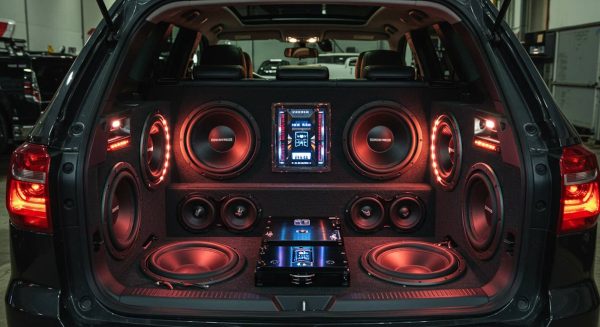Noise pollution occurs when unwanted or excessive sound disrupts normal activities or diminishes quality of life. In the context of vehicles, it encompasses any unwanted sound produced by cars, motorcycles, trucks, and other motor vehicles that exceeds acceptable levels for human comfort and well-being.
Noise Pollution Caused by Loud Vehicles
The Impact of Vehicle Noise
Loud vehicles are among the most significant contributors to urban noise pollution in the UK. Whether it’s modified exhausts, heavy goods vehicles, or motorcycles, the sound from these sources can reach levels that interfere with daily life, particularly in residential areas and city centres.
Common Sources of Vehicle Noise

- Engine and exhaust systems
- Tyre-road contact
- Aerodynamic noise at higher speeds
- Modified vehicle components
- Compression brakes on heavy vehicles
- Horns and sirens
- Loud stereos
- Power Take-off

Noise Pollution Laws UK
Legal Framework
The UK has specific legislation addressing noise pollution by vehicles. Under the Road Traffic Act 1988 and the Road Vehicles (Construction and Use) Regulations 1986, it is illegal to modify a vehicle’s exhaust system to make it noisier after manufacture. The law requires all vehicles to be fitted with an effective silencer and exhaust system that is maintained to work properly.
Enforcement and Penalties
Local authorities and police have powers to take action against excessively noisy vehicles. This can include:
- Fixed penalty notices
- Vehicle prohibition notices
- Prosecution in serious cases
- MOT failure for vehicles with excessive noise levels
Measuring and Monitoring Vehicle Noise
Decibel Levels
Most normal passenger cars produce between 70 and 75 decibels at urban driving speeds. However, modified or poorly maintained vehicles can produce significantly higher levels. For context, extended exposure to noise above 85 decibels can be harmful to hearing.
Impact on Communities
Health Effects
Research by the UK Department for Environment, Food, and Rural Affairs (DEFRA) has linked exposure to traffic noise with:
- Sleep disturbance
- Cardiovascular issues
- Stress and mental health impacts
- Reduced cognitive performance in children
Property Values
Studies have shown that properties on noisy roads can see reduced values compared to similar properties in quieter areas.
Solutions and Mitigation
Technical Solutions
- Electric and hybrid vehicles that reduce engine noise
- Low-noise road surfaces
- Sound barriers in urban areas
- Improved vehicle design and insulation
Driver Responsibilities As outlined in the Highway Code, drivers should:
- Avoid harsh acceleration
- Use appropriate gears to keep engine noise down
- Maintain vehicles properly
- Be particularly considerate in residential areas and at night
Future Developments
The UK’s transition to electric vehicles will significantly reduce engine noise pollution, though tyre noise will remain a challenge. The government’s commitment to net zero emissions by 2050 will naturally lead to quieter roads as more electric vehicles are adopted.
Community Action
Reporting Excessive Noise Residents can report excessively noisy vehicles to:
- Local authority environmental health departments
- Police non-emergency number (101)
- The Driver and Vehicle Standards Agency (DVSA) for commercial vehicles
Prevention and Education Public awareness campaigns help educate drivers about noise pollution and encourage responsible driving behaviour. Many local authorities now use noise cameras to identify and fine vehicles exceeding noise limits.
The reduction of noise pollution by vehicles requires a combined effort from manufacturers, authorities, and individual drivers. By understanding what noise pollution is and following best practices, every driver can contribute to creating quieter, more liveable communities.
Remember: While some vehicle noise is inevitable, excessive noise is often a result of driving style or poor maintenance. Making small changes to how we drive and maintain our vehicles can significantly reduce noise pollution in our communities.
